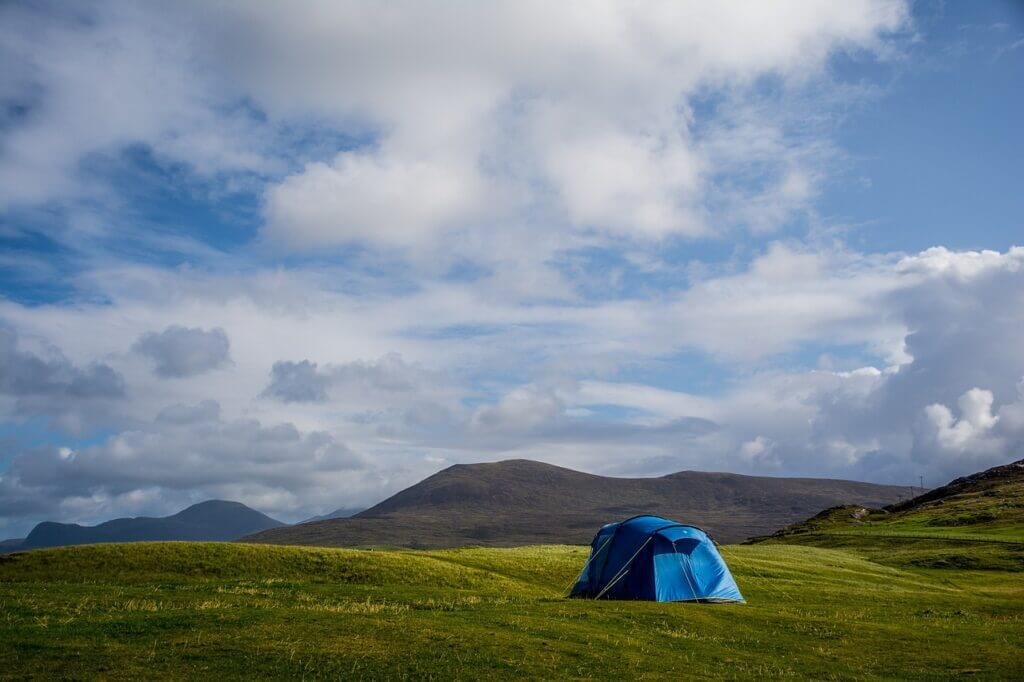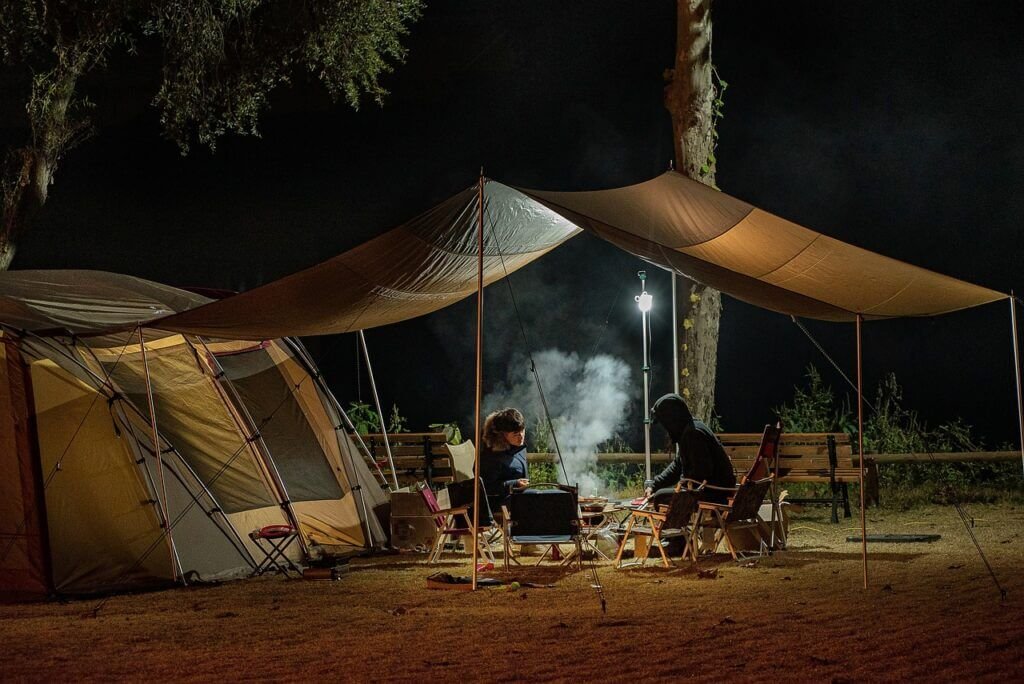Planning a camping trip can be an exciting but daunting task. With so many choices out there, it’s important to know how to choose the right camping location and site for your outdoor adventure. From secluded spots in the mountains to lively campgrounds by the beach, finding the perfect setting can make all the difference. In this article, we will explore some key factors to consider when selecting your camping destination, helping you make memories that will last a lifetime. So grab your backpack, pitch your tent, and get ready for an unforgettable experience in the great outdoors!

Researching the Camping Location and Site
Consider the Type of Camping Experience You Want
Before embarking on your camping adventure, it’s important to consider the type of experience you want. Are you looking for a peaceful and secluded retreat in nature, or do you prefer a more lively camping experience with amenities and activities? Determine whether you want to be surrounded by wilderness or prefer a campground with organized activities and facilities.
Research Different Types of Campgrounds
Once you have a clear idea of the type of camping experience you want, it’s time to research different types of campgrounds. You can choose from national parks, state parks, private campgrounds, or even primitive camping sites. Each type offers a different camping experience, so make sure to check their amenities, regulations, and available facilities before making a decision.
Check for Campground Amenities
Campground amenities can greatly enhance your camping experience. Consider the amenities that are important to you, such as running water, electricity hookups, picnic tables, fire pits, or even swimming pools. Some campgrounds also offer additional amenities like hiking trails, fishing spots, or playgrounds for the kids. Make a list of the amenities that are essential for your camping trip to help narrow down your options.
Consider the Campground’s Accessibility
The accessibility of a campground is an important factor to consider, especially if you have specific needs or preferences. Check if the campground is easily accessible by road and whether it has designated parking areas. If you have mobility concerns, look for campgrounds that provide accessible restrooms, paved pathways, and facilities that cater to individuals with disabilities.
Look for Nearby Attractions and Activities
Part of a memorable camping experience is exploring the surrounding attractions and activities. Research the area surrounding the potential camping locations to see if there are any nearby attractions that interest you. Whether it’s hiking trails, fishing spots, scenic viewpoints, or cultural landmarks, having nearby attractions and activities can add more excitement and diversity to your camping trip.
Considering the Campground Regulations and Rules
Check Campground Reservation and Registration Policies
Before finalizing your camping location, it’s essential to check the campground’s reservation and registration policies. Some campgrounds require advanced reservations, especially during peak seasons, while others operate on a first-come, first-served basis. Understand the reservation process and ensure that you comply with any registration requirements to secure your spot.
Review Campground Rules and Restrictions
Every campground has its own set of rules and restrictions to ensure the safety and enjoyment of all campers. It’s important to review these rules before selecting a campground, as they may affect your camping experience. Check for rules regarding quiet hours, campfire regulations, pet policies, and any other restrictions that may apply. Make sure that the campground’s rules align with your preferences and requirements.
Research Campfire and Cooking Regulations
If you enjoy cooking your meals over a campfire, make sure to research the campground’s campfire and cooking regulations. Some campgrounds have restrictions on campfire usage, such as designated fire pits or bans during dry seasons. It’s important to understand these regulations to ensure that you can enjoy your camping meals while complying with the campground’s rules.
Learn about Pet and Wildlife Regulations
If you plan to bring your furry friend along on your camping adventure, it’s crucial to check the campground’s pet regulations. Some campgrounds have specific areas designated for pets, while others may have restrictions or bans on certain breeds. Additionally, research the wildlife regulations in the area to ensure that you are informed about any potential encounters or precautions you need to take.

Assessing the Campsite Features and Facilities
Consider Campsite Size and Layout
The size and layout of the campsite can greatly impact your camping experience. If you have a large group or need additional space for activities, look for campsites that offer spacious areas. Consider whether you prefer a secluded site or if you prefer being closer to facilities like restrooms or water sources. The layout of the campsite should be conducive to your preferences and ensure a comfortable stay.
Evaluate Campsite Privacy and Noise
Privacy and noise levels are crucial factors to consider, especially if you value tranquility during your camping trip. Some campgrounds offer campsites with ample privacy, while others may have sites that are more closely packed together. Evaluate whether the campsite’s proximity to other campers or potential noise sources aligns with your preferences for a peaceful and quiet experience.
Check for Tent Pads or RV Hookups
If you’re planning on camping in a tent or RV, it’s important to check for tent pads or RV hookups at the campsite. Tent pads provide a level and designated area to set up your tent, while RV hookups offer electrical, water, and sewer connections for your RV. Assess whether the campsite offers these amenities to ensure a comfortable and hassle-free stay.
Look for Accessible Restrooms and Showers
Access to clean and well-maintained restrooms and showers is essential for a comfortable camping experience. Check if the campsite provides accessible restrooms and showers, especially if you have specific needs. Having these facilities nearby can enhance the overall convenience and comfort of your camping trip.
Review Water and Electricity Availability
Consider the availability of water and electricity at the campsite. Some campsites may provide potable water sources, while others may require you to bring your own water or have limited access. If you require electricity for your camping equipment, check if the campsite offers electrical hookups or if you need to rely on alternative power sources like generators.
Consider the Availability of Dump Stations
For RV campers, the availability of dump stations is an important factor to consider. Dump stations allow you to empty your RV’s holding tanks, ensuring a sanitary and convenient camping experience. Check if the campground provides on-site dump stations or if there are nearby facilities that cater to this need.
Evaluate Cell Phone Reception and Wi-Fi
For many campers, staying connected to the outside world is important, even while enjoying nature. Evaluate the cell phone reception at the campsite to ensure you’ll have reliable communication. Some campgrounds also offer Wi-Fi access, although it may be limited or available only in specific areas. Consider your connectivity needs and preferences when assessing these features.
Considering the Weather and Climate
Study the Average Weather Conditions
Understanding the average weather conditions of the camping location is vital for planning and packing. Research the temperatures, rainfall patterns, and seasonal variations to ensure that you come prepared with appropriate clothing and gear. Knowing the typical weather conditions in advance will help you plan a more comfortable and enjoyable camping trip.
Consider the Seasonal Variation in Climate
Seasonal variations in climate can significantly impact your camping experience. Consider how the location’s climate changes throughout the year to determine the best time to visit. Some locations may have extreme temperature fluctuations, heavy rainfall, or even the possibility of snowfall during certain seasons. Researching the seasonal variations will ensure that you choose a time that aligns with your preferences and comfort levels.
Check for Extreme Weather Conditions
In addition to studying the average weather conditions, it’s important to be aware of any potential extreme weather conditions in the camping area. Check if the location is prone to hurricanes, tornadoes, or other severe weather events. Understanding the risks associated with extreme weather will help you make an informed decision and take the necessary precautions to ensure your safety.
Research the Best Time to Visit the Area
Based on your preferences for weather and climate, research the best time to visit the camping location. Determine when the weather is most favorable for your planned activities and when the campground is less crowded. Choosing the optimal time to visit will increase your chances of having a pleasant and comfortable camping experience.

Assessing Safety and Security Measures
Research the Campground’s Safety History
Campground safety should be a top priority when choosing a camping location. Research the campground’s safety history, including any incidents or accidents that have occurred in the past. Look for reviews or reports that speak to the overall safety measures in place and the campground’s commitment to camper security. Prioritizing your safety will ensure peace of mind during your camping trip.
Check for Security Measures or On-site Staff
Consider if the campground has security measures in place or if they have on-site staff available to address any concerns or emergencies. This can include security patrols, gated entrances, or the presence of campground hosts. Knowing that there are measures in place to maintain a secure environment will provide an added sense of safety and comfort.
Evaluate the Campground’s Emergency Services
Understanding the availability of emergency services is crucial in case of unexpected situations. Research if the campground has access to emergency medical services, fire departments, or law enforcement agencies in case of emergencies. Knowing that help is readily available when needed provides peace of mind and ensures your safety during your camping trip.
Consider Nearby Medical Facilities
Accidents and illnesses can happen even during a camping trip, so it’s important to consider the proximity of medical facilities to your chosen camping location. Research the nearest hospitals, clinics, or urgent care centers in case you require medical attention. Knowing the availability of medical services nearby can make a significant difference in case of any emergencies.
Assessing the Natural Surroundings
Consider the Campsite’s Scenic Beauty
The natural beauty of the campsite can greatly enhance your camping experience. Consider the scenic beauty of the surroundings, such as breathtaking mountain views, serene lakes, or lush forests. A visually appealing campsite can provide a peaceful and visually captivating environment for your camping trip.
Check for Access to Hiking or Walking Trails
For nature enthusiasts, having access to hiking or walking trails near the campsite is essential. Research if the campground provides access to trails that showcase the natural beauty of the area. Whether you prefer scenic strolls or challenging hikes, having trails nearby will provide opportunities for exploration and appreciation of the natural surroundings.
Research Wildlife and Flora in the Area
Part of the camping experience is encountering and appreciating the local wildlife and flora. Research the wildlife and plant species that are present in the area surrounding the camping location. Whether it’s bird-watching, wildlife photography, or exploring unique flora, having a diverse and thriving ecosystem will add an extra layer of natural wonder to your camping adventure.
Consider Proximity to Water Bodies
If you enjoy water activities during your camping trips, consider the proximity of the campsite to water bodies. Whether it’s a serene lake, a flowing river, or an inviting beach, the option to swim, paddle, or fish can greatly enhance your camping experience. Research nearby water bodies to ensure that you can indulge in your favorite water activities during your stay.

Assessing Noise and Light Pollution
Check for Proximity to Roads and Highways
The proximity of the campsite to roads and highways can significantly impact the noise levels during your camping trip. If you prefer a more peaceful environment, choose a campsite that is set further away from busy roads or highways. Being mindful of potential noise disturbances ensures tranquility and a more immersive experience in nature.
Evaluate the Nearest Localities or Towns
Consider the nearest localities or towns to the camping location and assess their noise levels. Some campgrounds may be close to towns or busy areas, which can result in increased noise from nearby civilization. If you prefer a quieter camping experience, look for locations that are more remote and surrounded by natural surroundings rather than urban areas.
Consider Noise Levels from Other Campers
While camping is often associated with peace and quiet, it’s important to acknowledge potential noise from fellow campers. Evaluate reviews and feedback from previous campers to get an understanding of the noise levels within the campground. Some campgrounds may have designated quiet hours to ensure a peaceful atmosphere, while others may be more lively and cater to a social camping experience.
Assess Light Pollution in the Camping Area
For stargazers and nature photographers, assessing light pollution in the camping area is crucial. Light pollution from nearby cities or neighboring campsites can hinder the visibility of stars and the true beauty of the night sky. Choose a campsite that offers darker skies away from light pollution to fully immerse yourself in the wonders of the cosmos.
Considering the Distance and Travel Time
Evaluate Travel Duration and Distance
Consider the travel duration and distance to the camping location. Determine if the distance is manageable and if the travel time aligns with your availability and preferences. Factor in the time it takes to reach the campsite and any potential traffic congestion to make an informed decision.
Consider Fuel and Transportation Costs
Assess the fuel and transportation costs associated with reaching the camping location. Calculate the distance and estimate the fuel consumption to determine the approximate cost of transportation. Keep in mind that remote or secluded locations may require a longer journey and could result in higher transportation costs.
Assess the Accessibility of the Location
Consider the accessibility of the camping location in relation to your mode of transportation. If you’re planning on driving, check if the campsite has suitable road access and parking facilities. For those relying on public transportation, research the availability of public transit options or nearby transportation hubs.
Consider Traffic and Road Conditions
Evaluate the potential traffic and road conditions that you may encounter while traveling to the camping location. Consider peak travel times and potential construction or road closures that could affect your journey. Being aware of these factors will help you plan your travel itinerary accordingly and avoid any unnecessary delays or inconveniences.

Evaluating Campground Reviews and Ratings
Read Online Reviews from Fellow Campers
Online reviews from fellow campers can provide valuable insights when choosing a camping location. Read reviews on reputable platforms to get an understanding of the overall camping experience, the condition of facilities, and any potential issues that previous campers have encountered. Take note of common themes in these reviews to help you make an informed decision.
Consider Ratings and Recommendations
Campground ratings and recommendations can offer a quick glimpse into the overall quality of the camping location. Pay attention to the average ratings and take note of any highly recommended campgrounds. While ratings should not be the sole factor in your decision-making process, they can provide a useful starting point to narrow down your options.
Look for Reviews on Multiple Platforms
To get a comprehensive understanding of a campground’s reputation, check reviews on multiple platforms. Different platforms may have different demographics and perspectives, so reading reviews from various sources will provide a more well-rounded perspective. Take note of any consistent feedback or concerns across platforms.
Evaluate the Authenticity of Reviews
While online reviews can be helpful, it’s important to approach them with a critical eye. Keep in mind that reviews are subjective and that individual experiences may vary. Look for detailed and balanced reviews that provide specific examples and avoid reviews that appear biased or overly negative without substantiation. Exercise discernment when evaluating the authenticity and credibility of reviews.
Considering Personal Preferences and Activities
Consider the Camping Group’s Size
The size of your camping group can impact your choice of camping location and site. Ensure that the campground can accommodate the number of people in your group and has sufficient facilities to cater to everyone’s needs. If you’re planning a group camping trip, look for campgrounds that offer larger campsites or group sites to ensure a comfortable and enjoyable experience for everyone.
Evaluate Individual Accommodation Preferences
Consider the individual accommodation preferences of your camping group. Some may prefer tent camping, while others may prefer RV camping. Ensure that the chosen campground can accommodate the preferred camping style and has suitable facilities for each member of your group. Taking into account everyone’s accommodation preferences will help create a harmonious camping experience.
Check for Accessibility to Recreational Activities
If you have specific recreational activities in mind, ensure that the chosen campground provides accessibility to those activities. Whether it’s fishing, boating, swimming, or hiking, check if the campground is situated near the necessary resources or provides convenient access to recreational areas. Having easy access to your desired activities will enhance the overall enjoyment of your camping trip.
Consider Availability of Necessary Resources
Consider the availability of necessary resources that are essential for your camping trip. This can include grocery stores, fuel stations, equipment rental facilities, or firewood vendors. Assess if these resources are conveniently located near the campground, as accessibility to necessary supplies can greatly enhance your camping experience and provide convenience throughout your stay.
By thoroughly researching the camping location and site, considering regulations and safety measures, evaluating facilities and amenities, assessing the natural surroundings, and considering personal preferences, you can ensure that you choose the right camping location and site for a memorable and enjoyable outdoor adventure. Happy camping!


